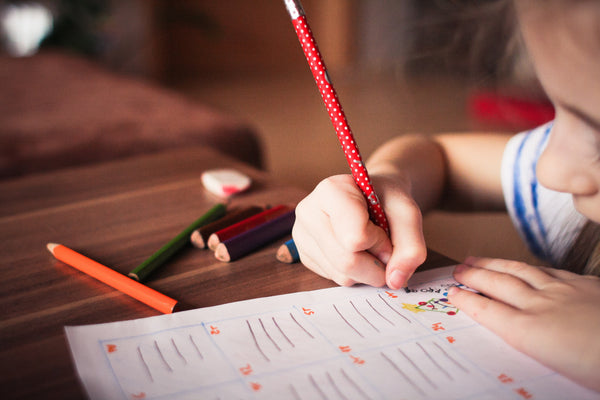Prepping for “The Interview”: What every parent should know
Posted on March 01 2018

Frayed nerves and increased heart rates – these are normal reactions before an interview, especially for young parents like you! Your child is due for an interview. Your child could be anywhere between 3 and 10 years old. The big day is coming soon! So what do you do? How do you prepare? It’s very normal (and in fact necessary) to have many unanswered questions or feelings of nervousness.
Let’s discuss the interview process & preparation, in a simple way that would help you and your little one sail through the big day as smoothly as possible.
Before we get down into the details, do remember your child is just a “child.” No matter how much you, as a parent, want your kid to get admitted to that preschool/school, remember they’re simply awesome no matter how they fare at the interview! Give them a big hug before and after and never dwell over the past.
What’s the deal with “The Interview”?
It’s important to know what the big fuss over a school interview is, so we understand the rationale behind it. The more we know about a situation, the better we are able to deal with it. The purpose of a school interview stays the same, even though everything else could vary from institute to institute.
- The school needs to assess if the child is ready for kindergarten
- The school needs to analyse if the student (and parent) is a good fit for the school.
- The school must ensure they are adequately equipped to provide for the student (in the case of additional learning support if the child has different needs)
- The school can gauge the parents’ rapport with their child. This helps mould the child’s potential future in academics and personality development.
- The school can understand a child beyond report cards and examinations.
- The parents can find out anything they would like to know about the school.
Mostly schools have oral interviews, and some may have written tests too for older kids. The purpose of both will tie back to the reasons listed above.
What to do and not do before “The Interview”?

- Encourage curiosity
This holds true even if there’s no interview lined up in the near future! Always encourage your little one to ask questions, be silly, find out answers. Never smother their “But Why(s)”, annoying as it may be to you, particularly on a challenging day.
- Provide context to the interview
Brief your little one about starting school or going to a new grade or moving to a new school. Why is it done? What does it involve? If possible, and most schools do allow this, visit the institute beforehand with your kid, take a casual tour, let them feel comfortable and not intimidated by a big step like this. In simple words, explain to them why the school authority (it could be the principal or a senior teacher) will ask certain questions or ask them to be part of certain group activities. Be as clear as possible while placing emphasis on the significance of this interview.
- Keep them happy
No matter how much pressure you feel as a parent, either before or during the interview, make sure it does not translate into your child’s stress. Kids can sense or get a vibe when their parents are upset or angry or sad. Crack jokes, smile a lot, hug them now and then. This attitude of keeping them positive will ultimately bring out their best in various activities or even academics. This cheerful outlook will also shine through during the interview because this is something the child will already be used to, and will not be putting up an act to impress the authorities.
- Do your research
Talk to people in your community, friends who have kids, anyone who has gone or is going through the interviewing process. Do your background research on the schools you’re applying to for admission. Find out the enrolment process, fees, and other conditions. Make sure to read the fine print (such as eligibility to join kindergarten based on the child’s date of birth). Inquire what may be part of the interview especially if there may be a written test or group activity.
- Brush up their basics
Familiarize your children with their basic concepts, such as her name, her parents’ names, who is in her family, where does she live, what does she like to eat, what time does she go to bed, what is her favourite hobby, etc. Other topics that could be taught to children include shapes, colours, fruits, vegetables, numbers, animals and birds. Simple poems or rhymes or even songs can be memorized.
- Identify potential questions
For older children, keep them abreast with current affairs or general knowledge. A basic topic like what he/she wants to do when they grow up could be an interesting thought starter. Understand that these questions are not asked to judge their knowledge or language, but more to understand their interactive, communication and motor skills. Speech, body language, attention, reading & handwriting and civic sense will be parameters that the child could be measured on.
- Maintain social etiquette
Basic table manners, shaking hands with new people, saying hello to others, being polite, wishing Happy Birthday or Happy Diwali, and most important of all, maintaining a smile throughout. These are skills that not only matter in a school interview, but they will be valuable teaching for the rest of their childhood. Remember, kids pick up etiquette easily from their adults, so practice what you preach!
- Dress comfortably
It’s important that you and your little one wear appropriate clothes that are comfortable and smart. Avoid “blingy” dresses or footwear that’s noisy. Go for shoes that are easy to wear and remove, in case the child has to participate in an activity that requires him to slip off his shoes. Comfortable clothes with minimal layers and accessories. Keep jewellery if any to a minimal. Try keeping the outfit as close to your child’s personality as possible. Kids should be relaxed and happy; they should not feel as if they’re a birthday present wrapped and ready to be delivered!
- Cleanliness is important
Keep practicing and teaching cleanliness at home, even if there’s no interview in the pipeline. Be strict with your child about personal and public hygiene. Littering is a strict no-no! Other good habits include washing hands frequently, throwing garbage in the trash can, cleaning up after themselves, keeping their toys/books tidy, keeping nails and hair short and clean. Most importantly, toilet training is a must along with the hygiene that follows it.
What kind of questions does your child usually need to know?

We’ve listed some common interview questions that may be asked. These questions cover a relatively bigger age group. It’s great to advise children on how these questions should be answered in case they face them in the interview. Encourage your little one to make full sentences, rather than answering with a “Yes” or “No.”
- What is your favourite colour/animal/rhyme/book/cartoon character?
- What food do you not like much? What food do you love?
- What subjects do you not like much? What subject is your favourite?
- What do you want to do/become when you grow up?
- What do you like doing in your free time?
- Do you play any sport? Which sport do you like to play?
- Are you learning any music or sport?
- Tell us about your family. Who all are in your family?
- Tell us about your brother/sister.
To us adults, the school education system is about formalizing education for our children. But for these tiny tots, this can be quite overwhelming, especially if your child is shy or reserved or is still catching up with peers in skills and knowledge. Young children are impressionable, and we often overlook the fact that they get affected by stress too. They may not be comfortable speaking up, so go easy on them and enjoy this process together as a team!
Author: Sneha Bhat
About: Sneha is an independent writer and book editor who loves good food, good design and a fantastic cup of tea. When she's not telling stories, she enjoys yoga and reading.
Images: Pexels
